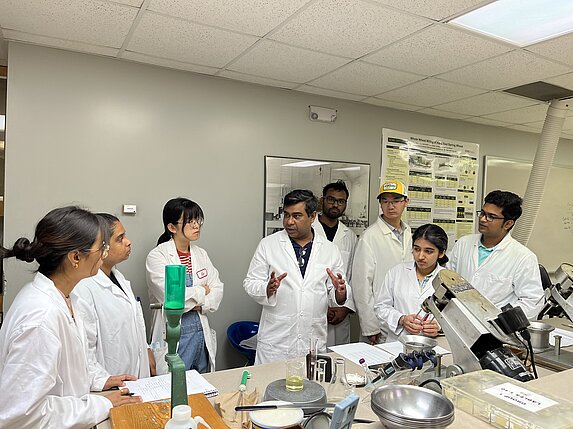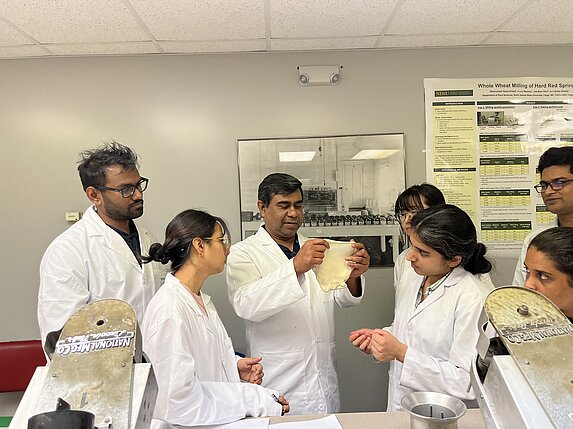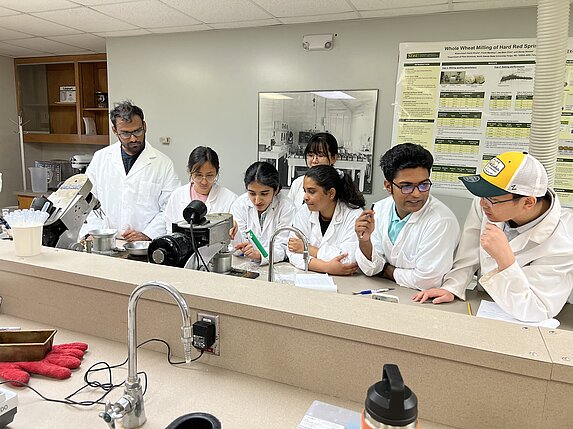Course Syllabus Fall 2023
Course Information:
Time: Lecture: Monday and Wednesday 10.00 AM to 10.50 AM
Laboratory: Thursday between 9.00 AM and 2.00 PM (It will be adjusted in the discussion of first lecture class)
Room: Rm 111 (Lecture) and 129 Harris Hall (Lab)
Prerequisite: CFS650
Credits: 3
Course Description:
The course is designed to teach
- Basics of flour testing, how to interpret data, fundamental concepts of the tests
- Science of baking, bakers math, function of ingredients
- Relationship between the ingredients and end-product quality
- Baking Methods and industrial design
Course Purpose and Objectives:
Developing a working knowledge of flour, dough and bread evaluation skills. Additional to theological knowledge, gain hands-on experience. Highlights the "whys" of the baking process and provides a thorough understanding of ingredient formulations and interactions. It will help you deal with the many variables and unexpected problems that occur during production. Research projects will help to gain a research perspective, in addition to applied knowledge.
IT Help Desk for technology concerns:
Contact Information for Help Desk Email:ndsu.helpdesk@ndsu.edu
Call: 701-231-8685 (option 1)
Health and Safety Expectations:
Please, refer to NDSU guidance on face coverings.
- As of August 17, 2022, no face coverings are required in class; however, you can keep wearing mask as a personal safety measure, if you would like to.
Students with Special Requirements:
Any students with disabilities or other special needs, who need special accommodations in this course are invited to share these concerns or requests with the instructor as soon as possible. The instructor may ask for verification and that, plus other assistance, can be requested from Disability Services in Lower Level of NDSU Main Library, Suite 17 (231-8463). http://www.ndsu.edu/disabilityservices/.
Veterans and Military Personnel:
Veterans or military personnel with special circumstances or who are activated are encouraged to notify the instructor as early as possible.
Honor System:
Academic Honesty: All students taking any course in the College of Agriculture, Food Systems, and Natural Resources are under the Honor System (http://www.ag.ndsu.edu/academics/honor-system-1). (The CAFSNR Website is undergoing change and there will be a new web address at some point during the semester).The Honor System is a system that is governed by the students and operates on the premise that most students are honest and work best when their honesty, and the honesty of others, is not in question. It functions to prevent cheating as well as penalize those who are dishonest. It is the responsibility of the students to report any violations of the honor pledge to the instructor, honor commission or the Dean of the College of Agriculture, Food Systems, and Natural Resources.
The academic community is operated on the basis of honesty, integrity, and fair play. NDSU Policy 335: Code of Academic Responsibility and Conduct applies to cases in which cheating, plagiarism, or other academic misconduct have occurred in an instructional context. Students found guilty of academic misconduct are subject to penalties, up to and possibly including suspension and/or expulsion. Student academic misconduct records are maintained by the Office of Registration and Records. Informational resources about academic honesty for students and instructional staff members can be found at www.ndsu.edu/academichonesty.
Course Requirements:
- Two 1 Hour lectures per week
- One Baking Laboratory per week.
- Lab reports (Submit the lab report in one week after the lab is completed).
Suggested Reading:
- Baking Science and Technology, Vol 1 and II. 4th Edition, E.J Pyler. Sosland Publishing Company, 900 W. 67th Street, Merriam, Kansas, 66202
- Principles of Cereal Science and technology. Jan A. Delcour and R. Carl Hoseney. American Association of Cereal Chemists, St. Paul, MN
-Notes will be provided, however, students are suggested to take notes during the lectures.
Course Design
The course will be divided into 7 modules, each of which will be further divided into sections, that include basic information, hands-on activity, evaluation, and feedback. For example, basic information would be in the form of text and figures (possibly video), hands-on activities would require the student to complete science-based activities and experimentations in the laboratory following the protocols and information given out in the laboratory hand-outs and class-room lectures. The evaluation section is used by the instructor to evaluate submitted exam papers, lab reports and project presentations. The feedback section is set aside for the students to provide feedback to the instructor regarding the degree of difficulty, accuracy, or any other concerns the student may have regarding the course information and activities.
Please Note: Lectures, laboratory sessions, and exams will be in-person.
Modules
Module 1 – Introduction
A. Introduction to the course content, evaluation process, and academic resources.
B. History of baking.
C. Introduction to baking process and ingredients.
Module 2 - Wheat grain composition and flour production
A. Basic information regarding the physical components and chemical composition of wheat grain.
B. Flour production by milling wheat grain.
Module 3 - Testing for baking quality prediction
A. Testing grain attributes related to baking quality.
B. Flour quality analyses to predict baking properties.
C. Dough physical testing related to baking quality.
Module 4 – Bread baking: steps, and basic procedures
A. Baker’s math for baking recipes.
B. Dough mixing procedures.
C. Fermentation and dough processing.
D. Baking to end-product.
E. Using chemical leavening in baking.
F. Baking varieties of pan bread
Module 5 – Baking Ingredients: Types and Function
A. Water, salt, sugars, and sweeteners.
B. Fats and oils; and milk and milk products.
C. Dough strengtheners, crumb softeners and emulsifiers
D. Starches and gums-eggs and egg products
E. Enzymes
Module 6 – Sensory characteristics and shelf life
A. Evaluation of baked products: physical and sensory.
B. Staling of baked products.
Module 7 – Bread baking for specialty
A. Hearth bread and gluten-free bread baking
B. Refrigerated and frozen dough.
Laboratory Experimentations |
|
Flour and dough testing |
|
Practice baking, familiarity with baking procedure |
|
Effect of mixing time and absorption |
|
Effect of milk and sugar |
|
Effect of shortening |
|
Effect of dough conditioners |
|
Effect of fermentation time |
|
Effects of salt and yeast Visiting a commercial bakery to learn operational procedure | |
Research projects—group study |
|
Research Projects
- I will provide students the research topics. Each group will pick one topic.
- Students will do literature search, come up with ideas. Do baking in the student baking lab.
- Write a report including abstract, introduction, material and methods, results, discussions, and references.
- I will advise about the experimental plan.
- You will have a presentation in December—each group will have 15 min (presentation) + 5min (question) = 20 min.
Grading:
1) Examination: 2 mid-terms (12+12) + 1 Comprehensive Final (16) 40
2) Laboratory Reports 30
3) Research Project (report + lab experiment + presentation) 20
4) Class-Lab Participation (attendance and participating discussions!) 10
Total: 100%
The Final Grade will be calculated:
Total Points Final Grade
90-100 A
80-89 B
70-79 C
60-69 D
59 and below F





